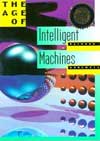
“What is artificial intelligence? At its essence, this is another way of asking a central question that has been debated by scientists, philosophers, and theologians for thousands of years: How does the human brain—three pounds of “ordinary” matter—give rise to thought? With this perspective in mind, inventor and visionary computer scientist Raymond Kurzweil probes the past, present, and future of artificial intelligence from its earliest philosophical and mathematical roots through today’s moving frontier to tantalizing glimpses of twenty-first-century machines with superior intelligence and truly prodigious speed and memory.
Lavishly illustrated and easily accessible to the nonspecialist, The Age of Intelligent Machines provides the background needed for a full understanding of the enormous scientific potential represented by intelligent machines and of their equally profound philosophic, economic, and social implications. It examines the history of efforts to understand human intelligence and to emulate it by building devices that seem to act with human capabilities.
In a sweeping approach reflective of his intimate knowledge of the subject, Kurzweil systematically builds on the great landmarks of human intellect. He weaves together the singular achievements of such major thinkers as Plato, Euclid, Newton, Babbage, Einstein, von Neumann, and Wittgenstein to provide an orderly and comprehensive understanding of the impact intelligent machines will have on the world as it enters the third millennium.
Running alongside Kurzweil’s historical and scientific narrative are 23 articles examining contemporary issues in artificial intelligence by such luminaries as Daniel Dennett, Sherry Turkle, Douglas Hofstadter, Marvin Minsky, Seymour Papert, Edward Feigenbaum, Allen Newell, and George Gilder.